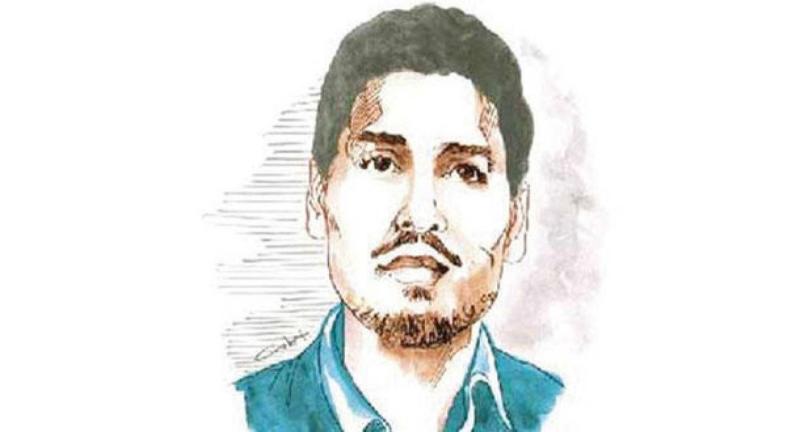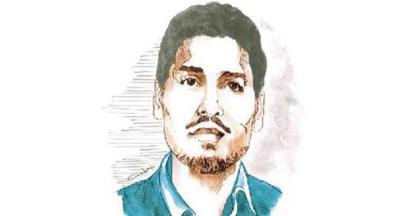Mohammed Deif is a prominent Palestinian poet and writer, born in the Shuja'iyya neighborhood of Gaza in 1936 and died in 2016. He was one of the most notable Palestinian poets who made significant contributions to contemporary Arabic literature. Deif's works are characterized by their emotional depth, addressing issues related to Palestine, nationalism, and identity in general. He had a considerable impact on Palestinian and Arab literature, receiving several literary awards and international recognitions for his literary contributions. His poetry collections include "Selected Poems," "Songs of Exile and Return," and "Gaza... The Spirit of the Land," among others, reflecting the experiences, struggles, and sacrifices of the Palestinian people. He later became one of the most wanted individuals targeted for elimination by the Israeli army and was appointed as the commander of the military wing of the Al-Qassam Brigades, the military wing of the Islamic Resistance Movement (Hamas).
### Birth and Early Life
Mohammed Diab Ibrahim al-Masri, known as Mohammed Deif, was born in 1965 into a Palestinian refugee family forced to leave their town of "Qubeiba" inside occupied Palestine in 1948. Initially, this impoverished family settled in a refugee camp before establishing residence in the Khan Yunis camp in southern Gaza. The family's extreme poverty forced him to work in various jobs early on to assist his father, who worked in a spinning shop. After growing up, he started a small chicken farm and later obtained a driving license to improve his income. During his university studies, Deif immersed himself in Islamic thought, joining the Muslim Brotherhood and becoming an active member of the Islamic Bloc, before joining Hamas, where he became one of its most prominent field operatives.
### Political Experience
In 1989, Israeli forces arrested Mohammed Deif, and he spent 16 months in prison without trial on charges of working within Hamas's military apparatus. His release coincided with the rising prominence of the Al-Qassam Brigades in the Palestinian resistance landscape, following several operations against Israeli targets. Deif moved to the West Bank with several Al-Qassam leaders from Gaza and spent some time there, overseeing the establishment of a branch for the Al-Qassam Brigades. He emerged as a leader of the Al-Qassam Brigades following the assassination of Imad Aqel in 1993.
### Operations Supervised by Deif
Mohammed Deif oversaw several operations, including the capture of Israeli soldier Nachshon Waxman. Following the assassination of Yahya Ayyash (one of the key symbols of resistance) on January 5, 1996, he planned a series of retaliatory operations that resulted in more than fifty Israeli casualties. During his imprisonment, Deif agreed with Zakaria Shurabji and Salah Shhada to establish a movement separate from Hamas aimed at capturing occupation soldiers, leading to the formation of the Al-Qassam Brigades. Deif played a significant role in developing and enhancing Hamas's weapons capabilities, making him a key figure on Israeli wanted lists. After the assassination of Salah Shhada, Deif took over and prepared a plan involving training non-suicide fighters and aimed to shift the battle to within Israel. In 2015, Washington placed him on its terrorism lists.
### Announcement of "Al-Aqsa Flood"
On the morning of Saturday, October 7, 2023, the commander of the Al-Qassam Brigades announced the commencement of a military operation against Israel, named "Al-Aqsa Flood," launching thousands of rockets towards it. In an audio message, Mohammed Deif stated that the first strike of "Al-Aqsa Flood" targeted Israeli military sites, airports, and fortifications, with 5,000 rockets and shells launched within the first twenty minutes of the operation. He indicated that this operation came in response to ongoing Israeli crimes against the Palestinian people and the Israeli occupation's disregard for international laws amid American and Western support and international silence.
### Charges Against Him
Israel, which has labeled him "the head of the snake" and "son of death," accuses him of being behind several major military operations against Israeli targets and has attempted to assassinate him multiple times, the latest being in the summer of 2014 during the aggression on Gaza. During that period, Israel carried out consecutive missile strikes on a home in the Sheikh Radwan neighborhood of Gaza, resulting in the loss of Deif's wife and infant son.
In light of Israeli tracking, Deif has remained cautious and alert, avoiding mobile phone usage and modern technological devices, being wary in all his movements, just as he is careful in choosing his small circle of close contacts. Although he has successfully remained alive over the past years, Deif, known as Abu Khalid, has come close to death in five assassination attempts in 2001, 2002, 2003, 2006, and the last in 2014. One of the most infamous attempts occurred in late September 2002, where Israel acknowledged that he miraculously survived when its helicopters struck vehicles in the Sheikh Radwan neighborhood, later retracting previous claims that Deif had been killed in that attack.
Despite reports indicating he suffered a direct injury leaving him paralyzed and in a wheelchair, Israel has not ceased its efforts and continues to consider him one of its most wanted individuals. Israeli intelligence has repeatedly attempted to eliminate Deif, justifying their failure by stating he is "a target with an extraordinary ability to survive," surrounded by mystery and extremely careful in avoiding detection. Deif never appears on media screens, and all that is known about him comes from his written or recorded statements, making it difficult for Israeli intelligence to succeed in eliminating him.




